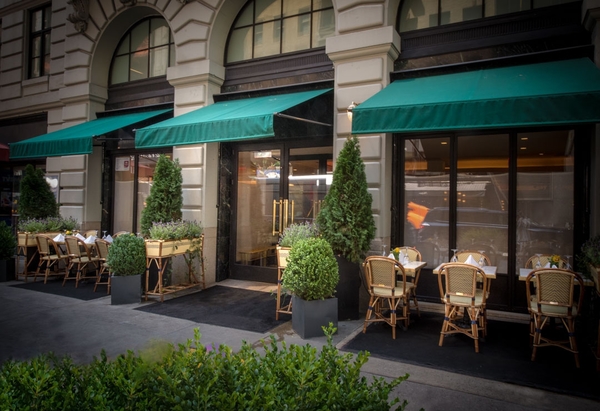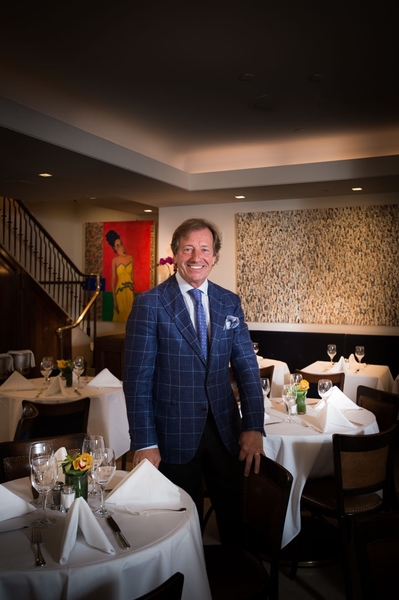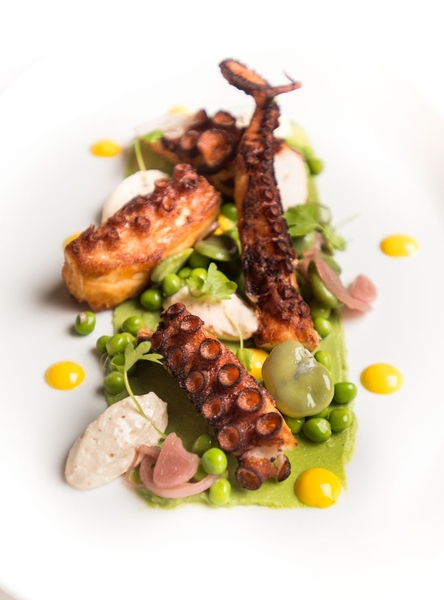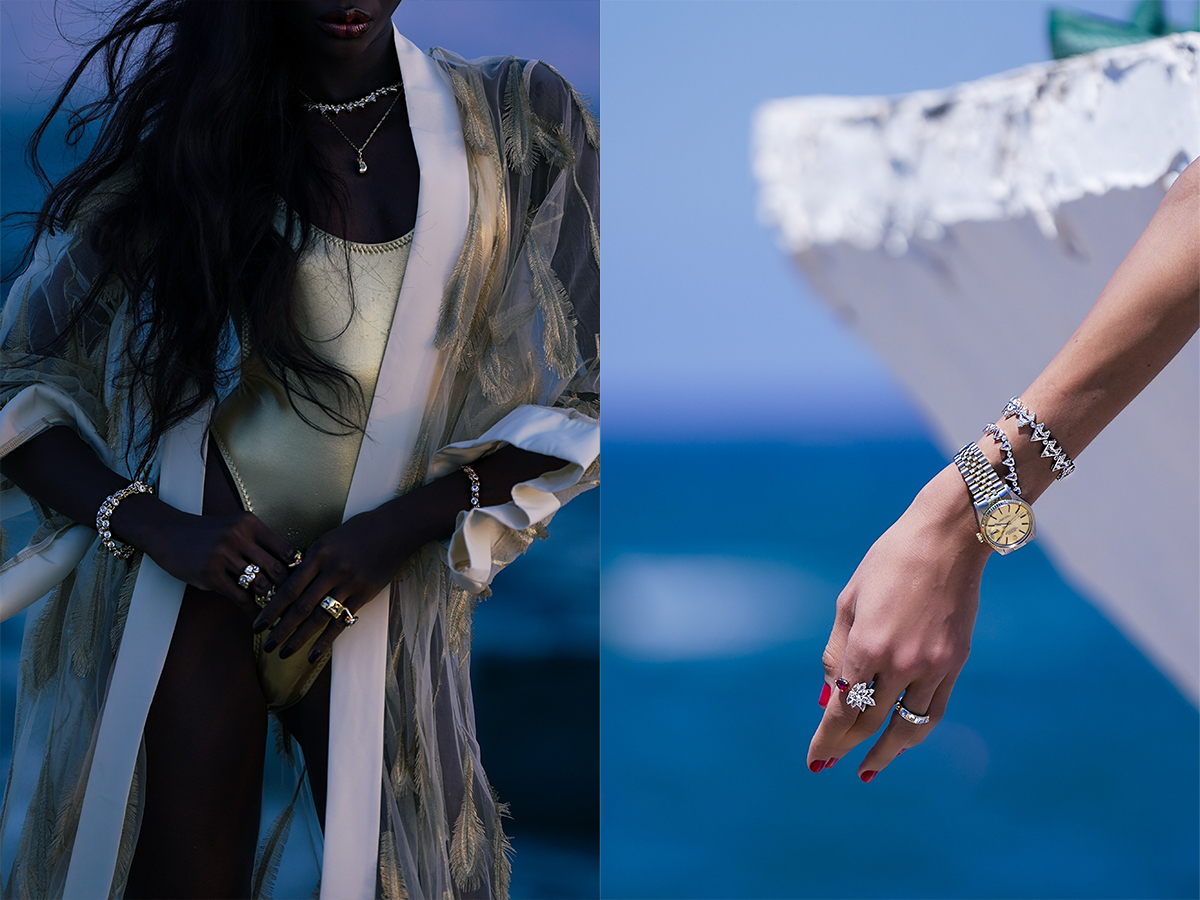Haute Cuisine: What You Need To Know To Get A Reservation at Posh Le Bilboquet

Photo Credit: Donnelly Marks
No one who is anyone is in Manhattan after the Fourth of July, so the urban legend goes. New York may be the city that never sleeps, but in warm weather it seems more like the city that’s taking a long nap. Shops and restaurants appear almost empty, and the traffic on Park and Madison runs light. The gilded set has vanished to the Hamptons, Millbrook or South of France–right?
Well, maybe it’s time to tweak the myth. Even in this remote-connect digital age, not all city machers abandon Gotham in July and August. The world, and the markets, move too fast. Sure, their weekends may be on the longish side, but mid-week you’ll find many power players pow-wowing in town, always att he ready to stay on top of their game. And if you want to find them, a good place to start would be at Le Bilboquet, the tony French restaurant on 60th Street, right off Madison. On one sweltering day in early July, the restaurant is so packed you wonder if you’ve time-traveled to the week after Labor Day, when the city bounds back to life. Bilbo is hopping, its front room filled with Gwyneth-style blondes (long straight hair, no makeup, super-toned bods), as well as with men wearing Brioni and women in Chanel cotton tweeds, who like like they run things, or inherited companies from parents or spouses who did.
Le Bilboquet is an unofficial club for the city’s uber-elite, owned by bona fide members of that elite— Ron Perelman, the Revlon billionaire; rock idol Eric Clapton; real estate mogul Steven Witkoff; and Philippe Delgrange, who founded the original Le Bilboquet on 63rd Street 30 years ago. Not surprisingly, the restaurant has long attracted a clientele as lustrous as its owners. In addition to Perelman, a Bilbo regular (he was spotted lunching in July, too), and Clapton, who comes often when he is in town from London, the reservation list has been crowded with names like Bill Clinton, Sting, Steven Spielberg, Charlie Rose, Bono and Anna Wintour, as well as regulars from the ’hood— that is, Park and Fifth Avenues.
Is there a place at Bilbo for mere mortals, you know, your average New York creative or millionaire, who isn’t a Page Six regular? Media reports suggest the restaurant has one of the toughest doors in the city, with diners turned away even when the restaurant is empty, making it the culinary equivalent of the Boom Boom Room. The New York Post even labeled Bilbo the snobbiest restaurant in town, which Delgrange, who is the on-site partner running the show, is quick to deny. “Not true, at all,” he says.
During lunch on this hot afternoon, we don’t see anyone turned away, but there’s not a person in the crowd who doesn’t look like they belong there. Regardless of who were to walk in, it would be hard to accommodate them, since there’s not a spare table in sight. (The night before, they did 200 dinners, a number some restaurants need a week to get to in summer.) Del grange moves around the room greeting, mixing and mingling. He sits at one table, then another, chatting quietly. With his ruddy, tanned complexion and blond hair, he looks as if he just spent the last week sailing along the Côte d’Azur, rather than spending his typical 12-to-14 hour days keeping Bilbo in top form for his “friends,” as Delgrange likes to describe much of his clientele. Judging from the easy camaraderie that fills the restaurant’s rarified air, Delgrange has many BFFs.

Not everyone gets a table at Le Bilboquet, Delgrange will admit to that. But he insists—his voice rising slightly—that exclusion here is not about snobbery, but rather about standards. “If you go to a restaurant like this, you dress properly,” he says. For all his cool friends and Côte d’Azur allure, Delgrange has an oddly endearing, yet stubborn sense of Old World propriety. “We’re not asking for much, just a minimum of respect. If someone comes here and is dressed well, they will never be rejected.” (Note to stylish Bilbo newbies—bring on the Birkins—the designer label quotient here is in the stratosphere.) And keep in mind that while you will make it through the door, you may have to work your way up to the front of the restaurant (the secret? Become a Bilbo regular), the site of its prime seats, the see-and-be-seen spots. If Ron Perelman is dining, he takes the center-left banquette near the entrance. Clapton likes a table to the right of the bar. When Bill Clinton came, he was seated in the equivalent of center stage, in the middle of the room. While Bilbo has three times the number of seats (110 versus 35) it had in its original location, the daily who-sits-where chart can be tricky to figure out. “I try to make everyone happy,” Delgrange says. “But you only have so many tables. You can’t make miracles.”
Even with his A-list business partners, Delgrange remains the driving force behind the restaurant, not only determining, along with his front room staff, who gets through the door, but also what goes on the menu (in collaboration with chef Julien Jouhannaud, an Alain Ducasse alum), the scope of the wine list and what gets served at the bar. He is at Le Bilboquet every day from 10 a.m. until midnight (the restaurant is closed only four days a year: Christmas, New Year’s, Fourth of July and Thanksgiving), doing whatever needs to be done—whether that means adjusting a light fixture or helping out in the kitchen—to keep the restaurant purring like a sleek Rolls Royce.
Delgrange, who is from Lille, says he came by his multitasking abilities the old-school way, working his way up from waiter in his native France, to positions with increasing responsibility in the U.S. at the nightclub Regines and later Le Relais, where he developed a following among the city’s Euro-chicsters. When he opened Le Bilboquet on 63rd Street, he had only 450 feet to work with and a kitchen better suited to a studio apartment than a soon-to- be bustling hot spot. He didn’t even have a liquor license. “I did everything myself,” Delgrange recalls, including wine runs by bike to the nearest liquor store and creating impromptu dishes depending on what was in his micro-kitchen larder. One serendipitous invention, Le Poulet Cajun, chicken with a secret mix of spices, became and remains one of his restaurant’s most popular dishes.

Photo Credit: Donnelly Marks
Delgrange believes his 24/7 work ethos is one of the reasons he has succeeded in a business with a dauntingly high fail rate. “Today, owners will work on a concept. Then they put a team in charge,” he says, maintaining that in the ruthlessly competitive New York dining world, where profit margins, as with so many bricks-and-mortar businesses, get tougher each year to maintain, restaurateurs—as ex- amples he mentions Eric Ripert, Jean-Georges and Daniel Bolud— who remain intimately involved with their businesses are the ones who endure. He credits his loyal clientele for his longevity, too. “I have people coming here for 30 years,” he says. “I know them, about their families. Their children come here, sometimes even the grandchildren.” But as, or even more important to his success, have been his uber-friends and partners, like Perelman, Clapton and Witkoff. “They kept on believing in me and that’s the only reason the place made it,” he says. And kept it alive when Bilbo lost its 63rd Street lease. “Eric said, ‘Don’t worry, I am here for you.’ Ron said the same thing.”
Lost sometimes amid the celebrity hubbub is another reason for Bilbo’s success—the quiet quality of the food, a Paris-St.Tropez-New York menu of well-sourced offerings. “I don’t like complicated dishes,” says Delgrange. He and Jouhannaud say the most popular one-percenter menu items include (in addition to Poulet Cajun) the Cobb Salad, Dover Sole—sourced from Brittany—and even the chocolate mousse, which they have somehow convinced their typical size-0 customers to sample again and again.
Come November, Le Bilboquet will have new items on its menu—or rather quite a few of them— when it opens a cafe next to the restaurant. The coffee no doubt will be superb, the pastries delicious; there will likely be an easier door. Even so, it’s probably best not to leave the designer duds at home.












